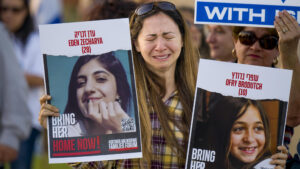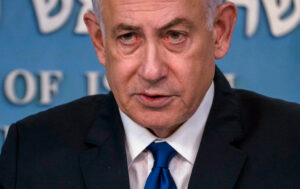The loud “baa” of a curious sheep feels ridiculously, laughably incongruous; the only other sounds are the bone-shaking booms of the IDF and Hezbollah exchanging artillery in the near distance. Before you join the road to Kibbutz Metzuba, just over a mile from the 30-foot wall that signals the border with Lebanon, a yellow sign warns of the danger of anti-tank missiles. But it is not just tanks they hit: in January, a mother and her son were killed as they drove home to pick up some of their belongings.
Standing proudly on the greenest part of a mainly arid land, the orchards here are filled with avocado and banana trees, their fruit lying unpicked or decomposing on the ground. One labourer from the area who dared to stay was recently shot from inside Lebanon; it is not worth the risk. Since October 7, 18 Israelis — 11 of them IDF — have been killed on this border, while 70,000 of its residents are now refugees in their own country. “Everyone from here has been evacuated,” Moshe Davidovich, a local mayor, tells me. “As you can see, it is an empty and sad place.”
Six months on, while all eyes in the West are on Gaza and the fall-out from Israel’s relentless war to oust Hamas, in the Holy Land there is more concern about what will happen on its northern border. For Israel is fighting a war on six fronts; in Gaza, Lebanon and the West Bank, as well as against the Houthis, the threat from Syria, and the even greater threat from Iran. On Thursday, anticipating retaliation following the killing of Iranian generals in Damascus, the IDF halted all leave. And nowhere are its fears more pronounced than in the north. How long, many wonder, until one of its daily skirmishes erupts into a full-blown war?
Until October 7, drones and UAVs (unmanned aerial vehicles) rarely troubled Israel’s defences. But Hezbollah has plenty of them — enough, it turns out, to bypass the Iron Dome. Some come with bombs; others take photographs; a few are on “suicide missions” charged with causing as much damage as they can. Sometimes they are sent to simply hover and goad, a menace intended to cause chaos on the ground.
Because they work partly via GPS, the IDF has knocked out the signal from Haifa, 45 miles from the border: if you check Google Maps, your scrambled phone will tell you that you are at Beirut airport. The result is that Israel’s northern war is markedly analogue, with the IDF going back to basics, dusting off old textbooks from 1956 that contain time-tested instructions on how to build the perfect foxhole. Their mission is the antithesis to the army’s usual tactics of defending by attacking: as long as their comrades are still fighting in Gaza, the IDF’s instructions in the north are to repel and safeguard the border. Phones are also taken off soldiers in the field; technology can no longer be trusted even in the start-up nation.
“One of the lessons learned on our part is that technology doesn’t replace old-school tactics,” says Lt Col Dotan, 55, a reservist who comes from Kibbutz Eilon just 1.25 miles from the border. “It is not for me to decide what happens next,” he adds. “But when you learn military history, you understand that to defeat the enemy, or make him concede to your terms, you have to take the initiative and manoeuvre.”

Further south, the mood remains jittery. Jerusalem in particular has the feel of a ghost town. Since the start of Ramadan almost a month ago, terrorist attacks have ramped up both in the city and in the West Bank. And while most Israelis support the war in Gaza, their confidence doesn’t extend to their prime minister. Demonstrations against Benjamin Netanyahu were rekindled last week. Some want a ceasefire; others want him to go quicker and harder in Gaza. They are all united by one thing: they want him gone.
But how likely is that? There remains a question mark over how much longer Netanyahu can keep his coalition of miscreants together, especially with many debating whether Charedi (ultra-Orthodox) men should be forced into the IDF. When so many soldiers are being killed — nearly 600 so far — secular Jews are no longer willing to have a section of the society that does nothing to protect the nation other than pray.
Further afield, the response from “allied” countries in the West is also taking its toll on the nation’s psyche. For lots of Israelis, the demonstrations in London, the attacks on Jews in American universities, and the calls for further boycotts only go to show that Jews will be hounded wherever they are. “I was amazed to find myself asking my mother, who was going to visit my sister in London, if she’ll be safe there,” remarks Matt, who moved to Israel from London 20 years ago. “We all know how dangerous it is becoming, and it worries us.”
Even after an Israeli drone strike tragically killed seven aid workers this week, many feel that their soldiers should own up to the mistake and continue their operation — the idea of ending the war before Hamas is defeated and the hostages are freed is inconceivable. “Everyone is very upset about what happened to the aid workers,” adds Matt. “No one wants people coming to help being killed. But mistakes happen in warzones: we have lost our own soldiers through friendly fire incidents.”
“We are making a much bigger effort than any other military in our situation,” insists military historian and retired Brigadier General Eran Ortal. “No one else is demanded to provide supplies to its enemy after this kind of massacre. No one. Google a photograph of liberated Mosul; no one demanded humanitarian efforts when the Iraqis and allies liberated it from Isis. We have gone an extra mile but it has no influence on public opinion in many countries so we will carry on doing what we are doing.” The implication here is grimly straightforward: if the Israelis have to go it alone, they will.
And yet, the eternally confused nature of this war means that the mood is never settled. On a sunny spring morning, Tel Aviv appears almost unscathed. The bomb-shelter signs have gone from the airport; the restaurants are busy again; the biggest danger seems to come from the legions of jellyfish in the sea. But everything is illusory. Behind closed doors, a fifth of Israelis have increased their use of addictive substances since October 7, in a bid to deal with their trauma. Tel Aviv is also the centre for the hostage families. Their pain is a constant wound for all the Israelis, their images plastered on the walls.
Outside the headquarters of the Hostages and Missing Families Forum, the latest visitors, a pair of politicians from Brazil, are having their photos taken. The hostage families have had meetings in the UK Parliament, the White House and the UN to encourage foreign governments to demand the release of their family members. So far, their efforts have proved futile: some 135 hostages remain in Gaza, around 100 of whom are thought to still be alive.
Inside, family members are lining up to tell their stories to the press. Their pleas are heartbreaking. The raw pain of one mother, Ayelet Samerano, whose son Jonathan was kidnapped by a UNRWA worker, is overwhelming. He is presumed to be dead, she says, but she just wants to “say goodbye and kiss him for the last time”.
Her torture is shared by many in Israel’s south, the epicentre of Hamas’s attack. On Kibbutz Kissufim, where 15 people were killed, widow Yasmin Margolis takes me to the step where her husband and the father of her two children, Saar, died. As one of the community’s security guards, he had been fighting off terrorists all day when he went to try and liberate the head of the kibbutz’s security, who had been taken hostage in his home by Hamas. Saar was shot dead, along with a soldier who came with him.

Today, the agricultural kibbutz is a ghost town of burned houses, their walls peppered with bullet holes. The battle that took place here still feels visceral; its remnants jar with the pretty decorations placed incongruously on bomb shelters and hammocks before October 7. Towards the end of last month, Yasmin’s older daughter Mia turned 10. As she blew out the candles, Yasmin asked what she wished for. “I don’t want to get murdered,” was her chilling reply.
“The feeling that someone always wants to kill you is not unfamiliar to me,” Yasmin, the granddaughter of Holocaust survivors, explains. “But it is shocking at the same time. There are parts of me that still do not believe it. Because my husband was in security, we always knew there was a risk, but we could never have imagined that they would kill babies or people at a party.”
And what of the future? As Western support for Israel becomes increasingly uncertain, as the death toll in Gaza continues to rise, and as further conflict simmers in the north, what will the next six months hold? Yasmin is resolute: “I still think this is the safest place for Jews to be. We have no choice but to stay.”
Disclaimer
Some of the posts we share are controversial and we do not necessarily agree with them in the whole extend. Sometimes we agree with the content or part of it but we do not agree with the narration or language. Nevertheless we find them somehow interesting, valuable and/or informative or we share them, because we strongly believe in freedom of speech, free press and journalism. We strongly encourage you to have a critical approach to all the content, do your own research and analysis to build your own opinion.
We would be glad to have your feedback.
Source: UnHerd Read the original article here: https://unherd.com/



